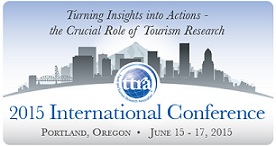Subscribe to RSS Feed (Opens in New Window)
|
A Moment in Time: Autobiographical Memories of Nature-based Tourists Jake D. Jorgenson, University of Montana - Missoula |
|
|
A Psychosocial Assessment of Agritourism Associations JING LI, North Carolina State University at Raleigh |
|
|
Benefits segmentation of a summer travel market: the case of Rocha, Uruguay Martin M. Sprechmann Mr, Universidad de la Republica Oriental del Uruguay |
|
|
Career Aspirations and Migration Intentions of Youth Living in a Tourism Destination Tammy Koerte, Pennsylvania State University |
|
|
Does Disappointment in the Evaluation of a Sporting Event Reduce Sport Consumption? Sukjoon Yoon, Texas A & M University - College Station |
|
|
Economic Viability of Heritage Festivals Karla Scott, Arizona State University |
|
|
Exploring local residents’ community attachment regarding the impacts of tourism on urban parks Ying Xu |
|
|
LET JUSTICE BE DONE, FROM COACH TO FIRST CLASS: EXAMINING SERVICE RECOVERY THROUGH JUSTICE THEORY Steven Migacz, Texas A & M University - College Station |
|
|
Not All Chinese Immigrants Are Homogenous: Domestic Travel Behaviour Patterns in Canada Ye Shen, University of Guelph |
|
|
The Effects of Motivation, Satisfaction and Perceived Value on Tourist Recommendation Shuyue Huang, University of Guelph |
|
|
Emily A. Smith, North Carolina State University Although North Carolina State Parks (NCSP) have recently experienced record-breaking visitation, proportional funding has not followed, leading to maintenance shortfalls and staffing shortages. The increased demand can also induce challenges such as overcrowding and overuse. Overuse combined with staffing shortages can result in the deterioration of the natural environment and park facilities and a decrease in visitor experience quality. NCSP are exploring management actions (i.e., state resident discounts (differential pricing), amenity pricing, reservation systems, and demand-based pricing) as tools to increase revenue and disperse use. However, altering fee structures or introducing nonfee reservation systems may impact park user behavior, including visitor displacement. This can affect gateway community stakeholders since many, particularly those in the tourism industry, rely on state park visitors to generate revenue. However, the full scope of impacts these management actions may have on gateway community stakeholders is unknown since limited literature exists on the subject. Therefore, before implementing new management actions, it is crucial for NCSP to identify and consider the economic, environmental, and social effects these actions may have on gateway community stakeholders. Utilizing Weber’s theory of formal and substantive rationality (WTFSR) coupled with the triple bottom line (economic, environmental, and social impacts), semi-structured interviews were conducted with gateway community stakeholders to understand their preferred management strategies, motivations for those preferences, and perceived impacts of management actions in NCSP. |
|
|
We Definitely READ Photographs-Effects of Text in Destination Photograph Viewing Qian Li, University of Illinois at Urbana-Champaign |


